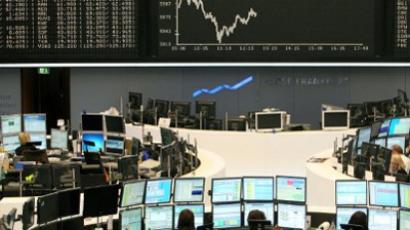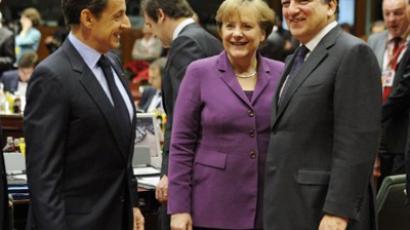EU fails to raise 200-billion-euro fund as small nations suffer
The EU has failed to raise 200 billion euros to fund an IMF rescue loan for its indebted members. The sum was promised at a summit of EU leaders 10 days ago, and the fact that it has not materialized signals further rifts within the 27-member bloc.
The package European Union finance ministers have come up with is 50 billion euros short of what is deemed necessary to help debt-stricken nations avoid default. The 200 billion fund became elusive after the UK – the biggest EU economy that does not use the euro – declined to contribute and pulled out of the deal being hammered out at the summit.The extra International Monetary Fund loans are meant to be channeled into a special fund that will run alongside the eurozone's own bailout fund, the European Financial Stability Facility (EFSF) – the body created to combat financial crisis and rescue countries like Greece. The eurozone hopes that its own loans, which will come via national central banks, will encourage other non-European countries to also support Europe via the IMF.The failure of EU countries to come up with the extra cash will come as little surprise given the financial mess prevailing in many states, some of which are struggling even to pay their membership bills.Take Estonia, for example. On paper, it is one of the most prosperous economies of the Baltic region. On the other hand, it is the EU’s poorest country. And a full year after joining the eurozone, Estonians say the positive changes they were promised are nowhere to be seen.“Recently, the European Commission checked our pensions. Our authorities told them we received an average pension of 600 euro. This is far from reality. Pensions in Greece reach 15 hundred euro, we here get around 200,” says Maria Linus, a pensioner from Maardu, Estonia. Estonia adopted the euro last January, but despite a generally positive attitude towards the move, it is mostly big business and politicians who have really felt the benefits of the transition.Glyn Ford, a former member of European Parliament says: “There are clearly political advantages – locking Estonia firmly within the EU. And there are economic advantages as well, from the point of view of investment.”But the euro adoption party has brought a painful hangover in its wake. In September, Estonia agreed to take part in the EFSF. Now, analysts are saying that membership is exacting a price Tallinn cannot afford to pay.“The formula for us is very bad. We have to pay a much higher share, a much higher percentage from our GDP than rich countries – something more than nine per cent from our budget,” Professor Ivar Raig of Tallinn University Law School told RT. “Estonia is EU’s poorest country and now we have to pay the debt of much richer states.” The country's central bank has even warned of a possible recession if the situation in the eurozone continues to deteriorate. Recent polls suggest up to 60 per cent of Estonians are now against their country's membership of the EFSF, with some saying they would rather help Greece with potatoes and firewood than see their pension money heading there.The government however, appears to be paying scant attention and is refusing to pull out of the relief fund. Adopting the euro sooner or later was a necessary condition for Estonia to join the EU, but being part of the EFSF was not in the agreement. And while some economists are beginning to question whether Estonia should continue remain in this organization, ordinary people are left counting the cost and wondering why and whether they should have to pay someone else’s debt.














